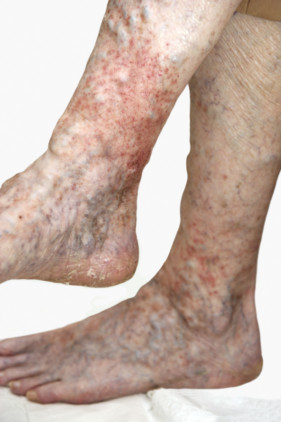
Does your skin itch a lot? Does it tear when you scratch? Do you feel that that there is nothing you can do to help alleviate the burning sensation? In all probability, you are suffering from eczema, a skin condition that it is very common around the globe and also here in the hot and dry conditions of the UAE.
Having said that, hot and humid conditions are not the only aggravtors of this condition - even being inside an air-conditioned environment affects the skin as it turns cold and dry, and therefore even more itchy, says Dr K. Balachandran, dermatologist and laser skin specialist, Aster Medical Centre in Bur Dubai.
The number of people developing eczema is increasing every year, he says. The only way to deal with it is to control the condition with ointments and by trying to find out what triggers this allergic reaction.
Presently, there is no treatment for this condition. Dr Balachandran says there are a number of causes for this skin flare-up.
To begin with, eczema is of two types: exogenous and endogenous.
The first - exogenous - means it is caused by external factors that act as irritants when the skin rubs against something, or by allergies. Even a brief touch of a certain plant, flowers, herbs and vegetables can trigger of the allergic reaction. (For people in the sub-continent, touching ‘arvi’ or Taro root vegetable, may trigger an itch).
Other irritants can be perfumes, hair dye or some skin-care products. “It could also be set off by certain medications or by infections (such as bacterial, fungal or viral infections),” says Dr Balachandran. Sun bathers can be prone to another type of eczema, such as the photo-sensitive eczema, which is caused by exposure to the UV (ultra-violet) rays.
While children are more affected by this affliction, certain medications such cholesterol-lowering drugs such as statins can trigger eczema in a small percentage of the adult population, he says.
The second type of eczema, termed Endogenous eczema, is due to genetic make-up and is caused by the person’s body, he says. “It can flare up even in babies as young as six weeks old.”
The terms dermatitis or skin inflammation, and eczema, are synonymous. This highly vexing skin condition starts off with a dry and itchy skin and no matter how much you scratch the area, the itchiness does not subside. If left untreated or uncontrolled, it can progress into a more serious condition wherein the skin develops into crusty scales and blisters, that erupt to ooze pus. “This is called weeping eczema,” says Dr Balachander.
Another trigger for eczema is Atopic dermatitis, which could begin as a response to certain types of clothing. “It’s very important,” he says, “that you wear cotton clothing which is is loose fitting. Avoid woollen clothing,” he says.
Stress or asthma also can be triggers for eczema.
Seasonal changes can also trigger it off, specially when the weather get colder or when there is low humidity in the air.
The most common areas for eczema flares up are: face, neck, wrists, elbows and knees. “If you are overweight or obese, the condition will flare up between the folds of the skin,” says Dr Balachandran. If you are diabetic, controlling blood sugar levels is absolutely crucial to manage eczema, he says.
An extremely embarrasing condition, eczema can lower one’s self esteem because due to many reasons. It hampers social interaction, makes the sufferer acutely conscious of his condition, and due to the skin discolouration , it places great stress on the indivodual’s mind about apeparance. However, the upside is that it is not contagious and contact-driven. “You will not pass on this condition to others through touch,” says Dr Balachander.
The most imporatnt thing to when suffering from eczema is to control it. “It rarely gets to the severe stage, but you must heed the doctor’s advice regarding its management,” he says. He believes it is also important to educate the pateient about the nature of eczema and all factors regarding it.
This skin condition, he says, runs in the families. The underlying reason why skin behaves in a volatile way is that there are defects in the skin barrier which let out the much-needed moisture and let in germs.













